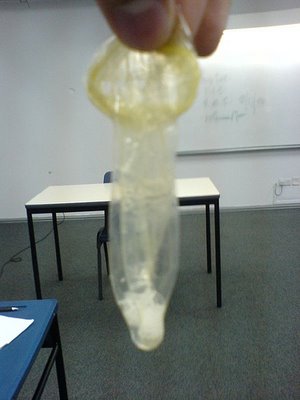 UNIVERSITY OF MISSOURI - MU Chancellor Brady Deaton has called a halt to a plan to distribute free condoms in MU residence halls.
UNIVERSITY OF MISSOURI - MU Chancellor Brady Deaton has called a halt to a plan to distribute free condoms in MU residence halls.Rejection of the plan came in a statement issued by the MU News Bureau on Tuesday. As recently as last week, campus officials were looking into types of containers to put in dormitory bathrooms to hold condoms for distribution, and an organizer said arrangements were being made for the Columbia/Boone County Health Department to provide 50,000 condoms.
MU spokeswoman Mary Jo Banken said condoms will continue to be available for free at the MU Student Health Center, the Women’s Center and the Lesbian, Gay, Bisexual, Transgender Resource Center.
“The chancellor decided not to implement the initiative to distribute condoms in the residence halls, but rather we will continue our current education programs for students,” Banken said.
Free condom distribution in MU residence halls was an initiative first proposed by Phi Beta Sigma fraternity and had the support of MU Residential Life and the Sexual Health Advocate Peer Education program, also known as SHAPE. After the chancellor’s announcement Tuesday, Susan Even, director of the health center, said the program had the support of campus health professionals.
Educational materials, which were to include posters next to condom baskets and wallet-sized packets with information on the appropriate ways to use condoms, had been prepared by the health education program within the health center.
Christopher Keller, president of Phi Beta Sigma, said the plan was to put 75 to 200 condoms in the 150 to 175 residence hall bathrooms, which the Residential Life custodial staff would be responsible for maintaining. He also said that depending on the program’s success, the fraternity might raise funds later in the semester for dental dams, a protective measure for oral sex, which the Health Department wouldn’t provide because they haven’t been approved by the U.S. Food and Drug Administration for prevention.
In response to the chancellor’s decision, Keller said that he is contacting other campus student organizations and plans to draw up a petition to demonstrate student support for condom distribution in residence halls.
“I’m disappointed at the fact that they are ignoring an issue that a lot of people are behind,” Keller said. “... We were making sure that it offered every aspect from simple protection to educational material. ... We included information on abstinence to information for other universities to look at and say, ‘This is something we want to pursue.’ We didn’t say, ‘Hey, let’s just throw some condoms around.’”
Keller added that he was frustrated that the chancellor’s office didn’t contact his fraternity to discuss the decision to halt the distribution program.
Banken said that MU received both positive and negative feedback about the plan. She said the difference of opinions was one reason that Deaton said future dialogue is necessary. She added that the chancellor commends students for coming up with “creative ideas” such as the distribution of condoms in residence halls, but felt there was the need for “more open dialogue” about ways to “educate and inform students about health-related topics” such as unplanned pregnancies and sexually transmitted infections.
The plan for distribution of condoms in residence halls was the result of an informal survey by Phi Beta Sigma of 50 females and 50 males. Heather Mueller of the health center and curriculum coordinator of SHAPE said the survey results showed that minorities tend to be more embarrassed about getting condoms on campus.
“It wasn’t a scientifically driven thing,” she said. “They kind of informally asked people within their fraternity and other fraternities about why minorities are more at risk.”
Mueller also conducted a survey in fall 2005 with a random sample of 6,000 students. The survey indicated that 30 percent of the students asked were embarrassed to purchase condoms.
In an interview before the initiative was stopped, Bill Monroe, regional HIV counseling and testing coordinator, said that easy access to condoms helps prevent sexually transmitted diseases.
“Studies have shown that availability doesn’t increase sexual behavior,” he said. “It’s going to happen with condoms or not, so it’s better to have them available.”
from The Missourian
No comments:
Post a Comment